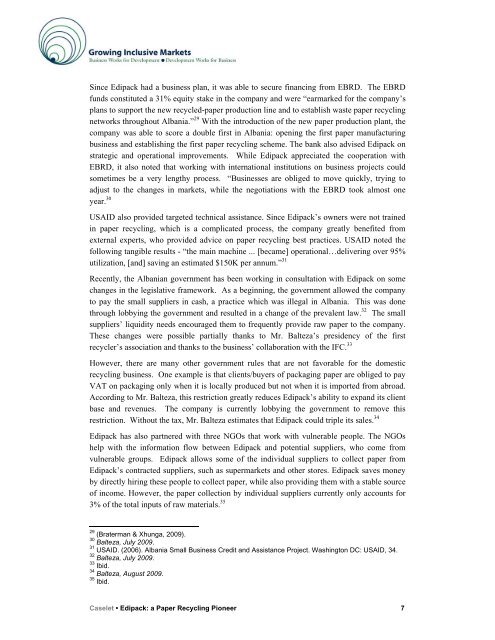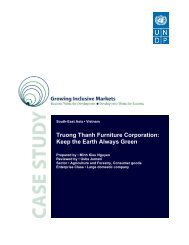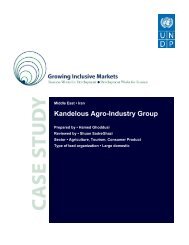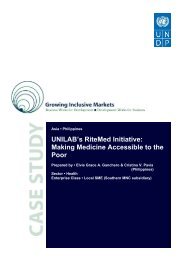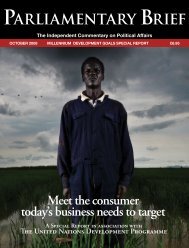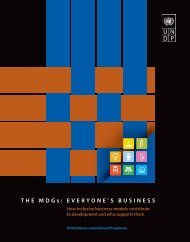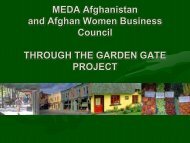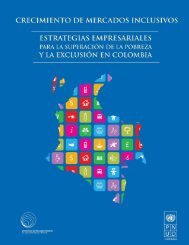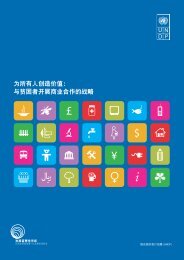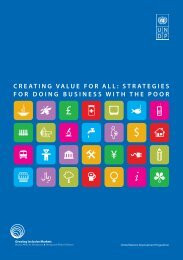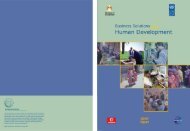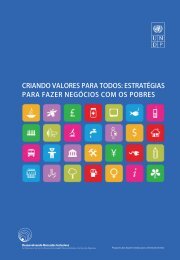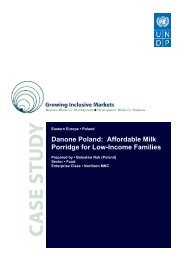Edipack: a Paper Recycling Pioneer - Growing Inclusive Markets
Edipack: a Paper Recycling Pioneer - Growing Inclusive Markets
Edipack: a Paper Recycling Pioneer - Growing Inclusive Markets
Create successful ePaper yourself
Turn your PDF publications into a flip-book with our unique Google optimized e-Paper software.
Since <strong>Edipack</strong> had a business plan, it was able to secure financing from EBRD. The EBRDfunds constituted a 31% equity stake in the company and were “earmarked for the company’splans to support the new recycled-paper production line and to establish waste paper recyclingnetworks throughout Albania.” 29 With the introduction of the new paper production plant, thecompany was able to score a double first in Albania: opening the first paper manufacturingbusiness and establishing the first paper recycling scheme. The bank also advised <strong>Edipack</strong> onstrategic and operational improvements. While <strong>Edipack</strong> appreciated the cooperation withEBRD, it also noted that working with international institutions on business projects couldsometimes be a very lengthy process. “Businesses are obliged to move quickly, trying toadjust to the changes in markets, while the negotiations with the EBRD took almost oneyear. 30USAID also provided targeted technical assistance. Since <strong>Edipack</strong>’s owners were not trainedin paper recycling, which is a complicated process, the company greatly benefited fromexternal experts, who provided advice on paper recycling best practices. USAID noted thefollowing tangible results - “the main machine ... [became] operational…delivering over 95%utilization, [and] saving an estimated $150K per annum.” 31Recently, the Albanian government has been working in consultation with <strong>Edipack</strong> on somechanges in the legislative framework. As a beginning, the government allowed the companyto pay the small suppliers in cash, a practice which was illegal in Albania. This was donethrough lobbying the government and resulted in a change of the prevalent law. 32 The smallsuppliers’ liquidity needs encouraged them to frequently provide raw paper to the company.These changes were possible partially thanks to Mr. Balteza’s presidency of the firstrecycler’s association and thanks to the business’ collaboration with the IFC. 33However, there are many other government rules that are not favorable for the domesticrecycling business. One example is that clients/buyers of packaging paper are obliged to payVAT on packaging only when it is locally produced but not when it is imported from abroad.According to Mr. Balteza, this restriction greatly reduces <strong>Edipack</strong>’s ability to expand its clientbase and revenues. The company is currently lobbying the government to remove thisrestriction. Without the tax, Mr. Balteza estimates that <strong>Edipack</strong> could triple its sales. 34<strong>Edipack</strong> has also partnered with three NGOs that work with vulnerable people. The NGOshelp with the information flow between <strong>Edipack</strong> and potential suppliers, who come fromvulnerable groups. <strong>Edipack</strong> allows some of the individual suppliers to collect paper from<strong>Edipack</strong>’s contracted suppliers, such as supermarkets and other stores. <strong>Edipack</strong> saves moneyby directly hiring these people to collect paper, while also providing them with a stable sourceof income. However, the paper collection by individual suppliers currently only accounts for3% of the total inputs of raw materials. 3529 (Braterman & Xhunga, 2009).30 Balteza, July 2009.31 USAID. (2006). Albania Small Business Credit and Assistance Project. Washington DC: USAID, 34.32 Balteza, July 2009.33 Ibid.34 Balteza, August 2009.35 Ibid.Caselet • <strong>Edipack</strong>: a <strong>Paper</strong> <strong>Recycling</strong> <strong>Pioneer</strong> 7


